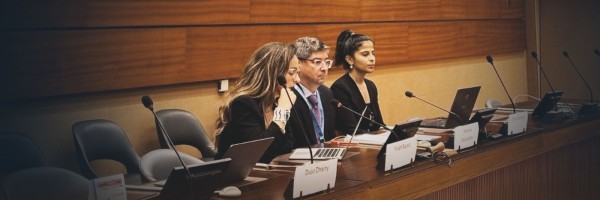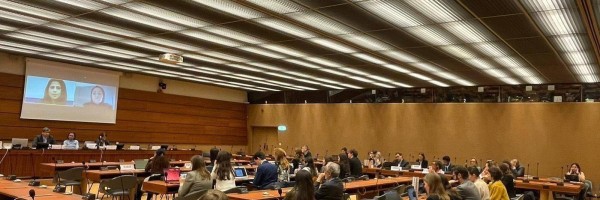On 1 May 2021, ALQST for Human Rights, Research Director at Democracy for the Arab World Now (DAWN), The Freedom Initiative and MENA Rights Group held a panel discussion entitled “Abdulrahman al-Sadhan and the crackdown on peaceful dissent in Saudi Arabia”. The event focused on the plight of humanitarian worker Abdulrahman al-Sadhan, who on 5 April 2021 was sentenced by the Specialised Criminal Court (SCC) to 20 years in prison for his peaceful online activism. Speakers highlighted the need for the international community to hold the Saudi authorities to account and call for al-Sadhan’s release. The event took place on the same day as a Global Day of Action, with vigils held in several cities and online action carried out under the hashtags #30DaysForSadhan and #FreeSadhan.
Areej al-Sadhan, sister Abdulrahman al-Sadhan, provided a brief summary of her brother’s ordeal, describing the emotional turmoil she and her family have experienced over the past three years since his disappearance. She explained how Abdulrahman was sentenced to 20 years’ imprisonment and a 20-year travel ban following a sham trial, including several hearings being held in secret. Today, no one, even Abdulrahman’s father, who is assisting his legal case, can speak to or see him. She highlighted how it is not just her brother who is in this dire situation, and there are countless other families struggling to get in touch with their detained relatives in Saudi Arabia, and called on international voices to speak out against these abuses.
Bethany Alhaidari, Saudi Officer at The Freedom Initiative, highlighted how the Specialised Criminal Court (SCC) in Saudi Arabia, which sentenced al-Sadhan, is neither impartial nor fair. She explained how the UN Special Rapporteur, Ben Emmerson, visited Saudi Arabia in 2018 to examine the court and found very concerning patterns, concluding that the court failed to meet the minimal requirements of due process. Alhaidari emphasised how we must recognise the problematic nature of the courts for, according to Saudi laws, anyone can be classified as a “terrorist”.
Brian Dooley, Senior Advisor at Human Rights First, pointed out that president Biden has pledged to redetermine the United State’s relationship with Saudi Arabia, and that the case of Abdulrahman, an entirely political process, is an easy test for his administration to pass, given that calling out human rights violations does not cost anything. Dooley concluded that it will take a lot of work for change in Saudi Arabia to come about, highlighting the need for more vocal international action.
Inès Osman, Director of MENA Rights Group, discussed how the sentencing of Abdulrahman was particularly harsh, meritting quick and effective international action for it to be overturned. She described his case as emblematic, noting an increased crackdown over the past few months in which several human rights have also been sentenced. She noted that this is due to a very restrictive legal framework which has been in place in Saudi Arabia for years, allowing the Saudi authorities to sentence anyone to prison for ‘terrorism’.
Abdullah Alodah, Research Director at Democracy for the Arab World Now (DAWN), emphasised the lack of accountability which has enabled the Saudi authorities to get away with such repression. If the Saudi authorities truly wanted to prioritise human rights then they would have dealt with the case of Abdulrahman al-Sadhan very differently. Instead, the whole process has lacked any credibility whatsoever.




